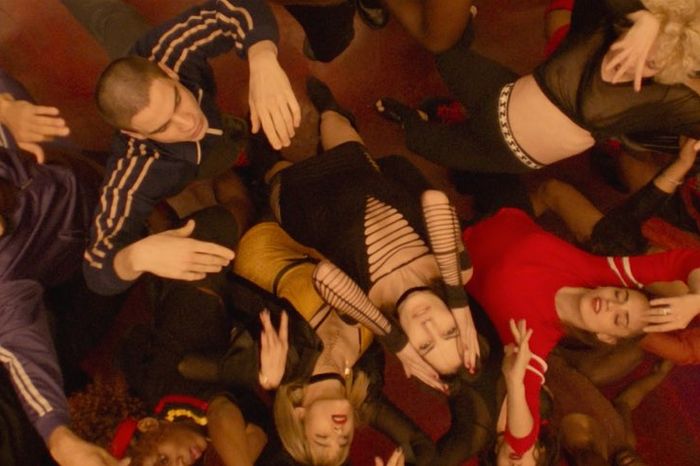
This review originally ran at the Cannes Film Festival.
Twenty minutes into Gaspar Noé’s Climax, I leaned over to my colleague, giddy with joy, and whispered, “He has to do so much at this point for me to hate this movie.” There was reason for my trepidation: This was Gaspar Noé, after all, noted dick of French Extremity, whose has announced his latest Cannes Film Festival entry with a brattily bombastic middle finger. There were many, many ways the film could go awry, and I wondered when the punishment was going to begin.
But to my delight, Noé had given us a surprisingly exhilarating, physical, and breezily humorous opening act. After a first shot that gives us a hint at the bloody direction all this is going, we see a series of video interviews with dancers auditioning for what appears to be a touring troupe. They’re a diverse mix of young people from multiple walks of life and styles of dance, heavily queer, who talk about their passion for dance, for partying, for drugs and sex, as well as their apprehensions about all of the above. There’s the girl from Berlin who left because the scene was too crazy, a pair of guys giggling nervously at the prospect of working with gay men for the first time, and the brother-and-sister duo who seem to be arriving with a bit of baggage, to say the least. Flanking the television on either side is a stack of VHS tapes and CDs — among them Suspiria and Possession — saving you the self-satisfaction of identifying Noé’s influence points and letting you just enjoy the ride.
Which you should. Climax is the best Noé has been in ages, and perhaps the most humane film he’s ever done. Try not to keep from grinning ear to ear once the interviews give way to a smashingly choreographed dance sequence, all the faces we’ve just met now putting their bodies in motion together in front of a huge, disco-spangled French flag. There is real joy in the sequence, all done in one shot, which is achingly optimistic in hindsight if only for its vision of best-case-scenario human harmony.
Once the convulsions and cutting and chaos take over, the word “humane” may seem like a stretch. (Spoiler alert/possible trigger warning: Once an adorable young child is introduced into the debaucherous mix, you know it’s not going to end well.) But for once, it doesn’t seem like the director is coming from a place of disdain for his characters. Noé has brought together a collectively vital and vibrant ensemble of dancers (none of which had ever acted onscreen before) loosely led by Sofia Boutella as their choreographer, and he seems to truly respect them. After the choreographed dance, we again make the rounds among them for a chat; snippets of discussions are presented in straight-on two-shots, flipped through like a slideshow, that slowly bring the web of relationships — crushes, hookups, grudges — into light. The dancers’ dialogue is mostly improvised, and the gossipy camaraderie and physical ease they have among each other becomes all the more delicious when it turns into psychedelic sex and violence.
That’s because someone has spiked the sangria, and pretty soon everyone’s feeling it. The group begins a collective, well-choreographed descent through stages of hallucinatory terror, orgiastic rage, and alienation. The action never leaves the dormlike facility in which the dancers have been rehearsing, and Noé’s camera roves it, ghostlike, picking a new subject to follow behind every few minutes in long, impressively coordinated takes. The space is more than a little creepy, all cinderblocks and dingy curtains and shadowy hallways. Two of the guys laugh early on that the place feels haunted, like some kind of ritual sacrifice has happened there.
I won’t pretend to know enough about the intricacies of French social issues and politics to make a reading into this, but the fishbowl dynamic of the film carries a subtle feeling of allegory. Maybe the building isn’t haunted, but the ghost of something makes the self-destruction of the group feel inevitable. At the height of the misery and chaos, a bold-faced title card reads, “Life Is a Collective Impossibility,” in case you missed the point. It’s a card that could be slapped in the middle of any number of horror films, and here, it’s wildly cathartic — even a little funny.
And, despite its supposed impossibility, there is a real celebration of life and the body in Climax, gothically extreme though it is. In a moment ripped right from Possession, Boutella writhes, screaming as the drug-induced convulsive terror takes over. Soundtracked by Aphex Twin’s “Windowlicker” — the film is meant to take place in 1996, for reasons that may be rather specifically French — it becomes a kind of solo dance of its own, athletic and gymnastic in its contortions and agony. As the film goes on, not everyone meets a cruel fate; some members of the ensemble even find a moment of tenderness together in the wake of the brutality. I was shocked to discover that I was actually … touched. Climax is a small miracle, and if this is Noé going soft (for him, of course), that might actually be a very good thing for the movies.

